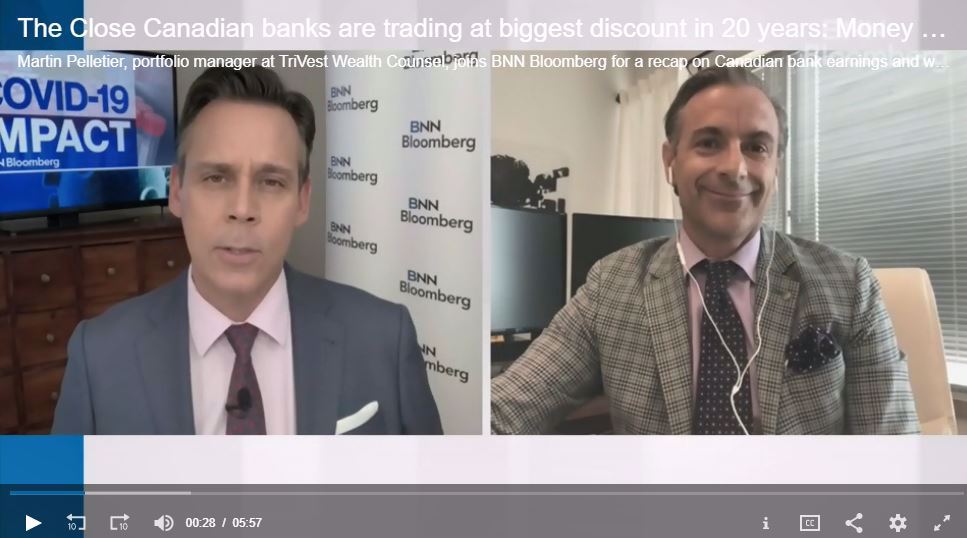Welcome to this month’s Invest Wisely.
This issue we spend a bit of time on estate planning including the importance of reviewing your will and undertaking some advanced wealth planning involving the use of insurance and other strategies as we head into the remainder of 2020. Specifically, we take a look at three strategies investors can use to reduce their tax bill in these uncertain times.
We also provide a market update and some forward positioning ideas. There was a bit of tree shaking over the past week especially in the frothy technology sector, but we view this as signs of a healthy market. That said, there are other areas that are experiencing flu-like symptoms such as banks and energy, which could prove to be a great opportunity for those brave enough to position for the eventual longer-term recovery.
Finally, we also share some of the more interesting articles of the month, including behavioral finance, market strategy, disruption, Canada, and some fun and motivating stories/videos.
As we head back to work, our kids head back to school and those enjoying retirement remember to be smart, stay safe, and invest wisely.
Playing the Long-Game
Three strategies investors can use to reduce their tax bill in these uncertain times
Turmoil seems to be everywhere this year and it’s no different in Ottawa, where we’ve seen a sudden change of finance ministers and the shutting down of Parliament. These moves, along with the lack of information on the federal government’s record-setting spending — not to mention how they plan to pay for it — are leaving many justifiably wondering what is on the horizon.
For investors, trying to guess where those changes will lead only adds to their anxiety — instead we think they should focus on areas investors can control, but often neglect, such as ensuring that they are taking advantage of those tax planning strategies that are still relevant and effective.
Insurance
While not the most exciting topic, insurance can play a very important role when it comes to tax planning.
For example, adding an insurance policy, otherwise known as a Corporate Estate Bond, within Canadian-controlled private corporations (CCPCs) can not only provide a tax shelter, but also dramatically increase the terminal value of your estate by funding any tax liabilities for pennies on the dollar. For those with active income within their CCPC, such as a doctor, adding in insurance can help manage the new passive income rules and its impact on the federal small business limit of $500,000.
There are also borrowing strategies available to access the funds early instead of increasing dividends from the corporation which you have to pay tax on, therefore managing your cash flow in a very efficient way. In some cases, these types of strategies may allow other assets to flow through the CDA tax-free in addition to the death benefit.
Spousal Loans
When annual income is not consistent between spouses or asset ownership in the non-registered portfolios is imbalanced between spouses, annual tax efficiency can be lost. Investment earnings may be taxed in the hands of a higher income earning spouse at the top marginal rates versus allocating to a lower income earning spouse where the graduated income tax rates can be used.
Unfortunately, the Canadian income tax rules (attribution rules) won’t allow a simple retilting of assets between spouses. Without proper planning, the investment income would trace back to the original ownership, negating the purpose of the strategy.
To shift income from one spouse to another, a spousal loan strategy can be used. This involves transferring assets from one spouse to the other or liquidating a portfolio and transferred cash for investment and taking back a demand loan for the value transferred. An added benefit is that the prescribed rate was recently reduced to one per cent from two per cent.
However, before undertaking such a strategy, there are a number of important considerations that need to be made so it is imperative to review the details of your situation with an appropriate tax expert.
Family Trusts
Setting up a family trust can also offer a number of benefits. It can provide for income splitting to family members in lower tax brackets to achieve overall tax minimization; funding education costs for children more tax efficiently; creating the ability to use multiple capital gains exemptions; reducing future estate taxes by transferring future value to the next generation; and providing creditor and marital claim protection.
That said, unfortunately, assets cannot be rolled into a Family Trust tax-free so any built-in gain on assets slated to be transferred into the trust will be triggered prior to the contribution. In addition, like the spousal strategy, there are tax and legal consequences to consider before implementing. Therefore, a Family Trust should be set up in consultation with a qualified CPA and tax attorney to ensure your goals are accomplished.
There are many other strategies worth considering besides these three such as estate freezes, gifting and charitable giving. Creating a financial plan is a great place to start and will help identify those that are worth exploring further. Just because there is chaos in the management of our nation’s finances, it doesn’t mean there has to be chaos in yours.
Please contact Craig or Martin if you would like to explore any of these strategies and/or undertake a wealth planning review. We would make available access to our Advanced Planning Team, which we have found to be an invaluable resource to our clients.
What the Dow booting Exxon for tech really means to investors
Last week, the Dow Jones announced a plan to remove the index’s longest-serving member — Exxon Mobil — in favour of three companies with a heavier tech focus, Salesforce, Amgen and Honeywell. We think this change is representative of something much bigger that is going on, a phenomenon that helps explain the perceived disconnect between the broader economy and the stock market.
When drilling deeper into recent gains in stock markets, it is clear that there have only been a few companies leading the way, while the majority of stocks are still lagging behind. Essentially investors have been plowing money into those companies that they think will benefit from the accelerated digital shift brought about by the pandemic, while selling old-school sectors such as energy and financials.
As a result consumer discretionary stocks (thanks to Amazon being 43 per cent of the index) and information technology stocks are up double-digits over their all-time February highs, while energy and financials are down significantly over the same period.
Interestingly, nearly two-thirds of the companies in the S&P 500 are underperforming the index this year, only one-third of the stocks are positive this year with the share prices of a fifth of S&P companies currently more than 50 per cent below their all-time highs. This shift has been so pervasive that the five largest stocks in the S&P 500 have a combined market capitalization that equals the smallest 389 stocks in the index, according to Michael Batnick is the Director of Research at Ritholtz Wealth.
At more than US$6 trillion, the market capitalization of Apple, Amazon, Microsoft and Google is greater than the GDP of every country in the world with the exception of the U.S. and China. Apple is setting new records with a price-to-earnings ratio of 35 times. Meanwhile, you now have a company like Tesla becoming the 9th-largest company in the U.S., even bigger than Walmart despite only having five per cent of the revenue.
Given the limited tech exposure elsewhere, international developed markets as represented by the MSCI EAFE index is still down seven per cent this year, and emerging markets are down approximately two per cent. Closer to home, the S&P TSX is down 1.7 per cent thanks to Shopify that is up nearly 165 per cent and now represents 6.5 per cent of the index.
We think this could continue for some time as the saying goes markets can remain irrational longer than most can remain solvent — especially those trying to short this momentum. However, for the few contrarians left out there, opportunities remain especially should the broader economic recovery continue and old habits return.
For example, we’re already starting to see that in energy, and with global demand adding over 13 mmbbls/d over the past months returning it to 89 per cent of pre-pandemic levels. Eric Nuttall, portfolio manager at Nine Point Partners, pointed out on twitter that U.S. gasoline demand is down only five per cent from pre-pandemic levels.
The big question is how to play this going forward.
Being the risk-managers we are, we prefer more of a balanced approach as it offers some benefit from the ongoing tech rally but is also cautious due to the level of euphoria out there. This means owning a combination of the broader Canadian, EAFE and U.S. markets and for those who haven’t diversified, the good news is the Canadian dollar has recently been on a tear against the U.S. dollar making it that much less expensive. We also favour ETFs and stocks exhibiting lower levels of volatility such as what we’re seeing in the telecom, consumer staples, utilities and materials sectors.
Finally, make sure you don’t give in to your inner FOMO by chasing the current momentum in the so-called shift to the new world economy. This is when it’s important to have a well-laid-out gameplan focused on the long-term fundamentals and then stick to it.
Word on the Street
Martin Pelletier BNN/Bloomberg market update
Martin Pelletier, portfolio manager at Wellington-Altus Private Counsel, joins BNN Bloomberg for a recap on Canadian bank enarings and why he thinks there is a lot of opportunity in financials.
When is the last time you reviewed your Will?
Making arrangements for one’s mortality isn’t an exercise that often makes it to the top of the to-do list when it comes to planning, but it should be, especially for those starting a family or those in retirement.
Having a properly drafted will is essential to ensure your wishes are fulfilled, since not having one can expose your family to a whole bunch of risks, such as allowing the government and legal system to decide who gets what.
BEHAVIORAL FINANCE
43% of retail investors using leverage and 44% are trying to time the market. What could go wrong?
Read Here
We create narratives to explain the inexplicable. We much prefer a comforting story to an uncomfortable truth. We seem these narrative in the explanations of the rally and the correction.
Read Here
By moving to a fiduciary role, a lot of the challenges around determining what is appropriate for the client will be addressed by mapping out risk willingness and ability alongside KYP.
Read Here
The inside story of Robinhood’s billionaire founders, option kid cowboys and the Wall Street sharks that fed on them.
Read Here
MARKET STRATEGY
Is it finally the time for value stocks?Lower-priced stocks could be on the verge of a comeback.
Read Here
For the contrarians out there, this quarterly update by Fidelity is well worth the read.
Read Here
Upside-Down Markets: Profits, Inflation and Equity Valuations in Fiscal Policy Regimes
Read Here
One person familiar with SoftBank’s trades said it was “gobbling up” options on a scale that was even making some people within the organisation nervous.
Read Here
DISRUPTION
Not surprising, but pretty stark: who gets to work from home
Read Here
These are the areas investors should watch for pandemic transformations
Read Here
Space available for sublease in downtown Toronto nearly tripled to 1.7 million square feet in August from the end of last year.
Read Here
OH CANADA
Worried about the Canadian government taxing principle residences – listen here
Listen Here
Canadians have 500,000+ mortgages on deferral, down 18% from Q2
Read Here
You have investors saying the status quo in the junior oil & gas sector clearly isn’t working,’ said Martin Pelletier, a portfolio manager at Wellington-Altus Private Counsel
Read Here
Positive, Fun, Innovative & Changing the World
How much is enough?
Life is so much more than your attachments because all you will see and want are other people’s attachments. Perhaps life should be like the McDonald’s menu, “just enough.”
Read Here

Education is freedom
This is such a powerful image. These girls are sitting their university entrance exams in Afghanistan …under a heat of 37C…on the ground…social distant…during a pandemic…because they know that only education will make them free.
Read Here
Some parting wisdom from Chadwick Boseman
“Enter through the narrow gate. For wide is the gate and broad is the road that leads to destruction, and many enter through it. But small is the gate and narrow the road that leads to life, and only a few find it.”
Watch Here
Your brain and what it lets you see
Beneath our awareness, the brain lets certain kinds of stimuli automatically capture our attention by lowering the priority of the rest.
Read Here
A splash of water and a small fortune
Matthew Robson, from Taunton, was born in 1992 and over the course of his life his father Pete has spent about £5,000 on 28 bottles of Macallan single malt. The collection is now worth more than £40,000 and has been put up for sale.
Read Here








